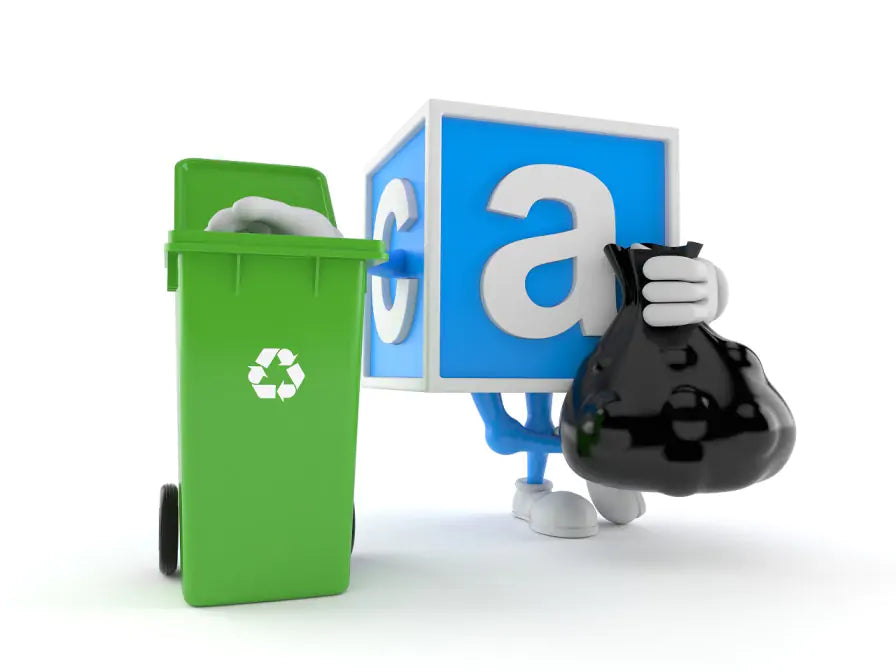Why not add these to compliment your wheelie bins?
Your basket is currently empty.
Shop NowWe guarantee to have the lowest price! Find the same bin for a cheaper price and we will beat it!

In this series of blogs, we’re going to look at rubbish. From the good, to the bad and downright ugly, we’ll be looking at everything you ever wanted to know, from A right down to Z.

How many times have you seen piles of waste dumped in alleyways, at roadsides, or even worse, at beauty spots?
Dumping waste is illegal and punishable with a fine or even a jail term but it still doesn’t stop some unscrupulous people from blighting our towns, cities, and green spaces with it, causing harm to wildlife, the environment and human health in the process.
Why do people dump waste?
Too much waste is being generated
In our throwaway society, people are buying ever more consumer goods, and items like clothes, appliances, and electronics are regularly thrown away. Electronics and appliances often get dumped as people seek to buy the newest model, and so-called fast fashion means we are throwing away more clothes than ever.
People don’t want to pay fees at the tip
Residents and businesses are charged for using rubbish tips so many people either hire an unlicensed ‘man with a van’ to dispose of their rubbish, or they just dump it themselves. Either way, the rubbish ends up somewhere it’s not meant to be.
People don’t make the effort to recycle or they find it confusing
Some people think recycling is too much of an effort, they don’t know what they can recycle, and sometimes, they don’t want to pay a charge for their local council to come and remove bulky items like white goods and mattresses so they dump them instead. Most of these goods are recyclable or reusable so a lot of valuable material ends up going to waste.
What are the effects of dumping waste?
Environmental damage
Dumped wasted causes land, water, and air pollution. Chemicals and materials that don’t decompose can contaminate soil and groundwater, and decomposing waste can give off greenhouse gases into the atmosphere. Wildlife can also be harmed by chemicals and eating, getting trapped in, or injured by discarded waste.
It can be a fire hazard
Piles of dumped waste can be a fire hazard, especially organic waste or items like tyres.
It makes areas less desirable
Areas where large amounts of waste is dumped automatically become less desirable to live and work in, not to mention, they tend to be hotspots for crime. Dumped waste can also make areas less attractive to tourists, so it can have a considerable economic impact.
It poses a health and safety risk
Dumped waste can contain hazardous substances, sharp items, and many more things that are harmful to human health, especially if it’s dumped in areas where children play. Waste can also attract pests like gulls and vermin which pose their own risks to health.
It hits taxpayers in the pocket
Millions is spent by councils every year cleaning up dumped waste. This money could be far better spent on front line services for people who are in need.
So what can be done about illegal waste dumping?
People should be vigilant
Many people are of the opinion that cleaning up waste is the council’s responsibility, however we all want the areas we live and work in to be clean and safe so we should all play our part. It’s our job to be on the look out for people illegally dumping waste and reporting it to the council so the perpetrators can be brought to account.
Education and awareness programmes are key
More people need to be educated about the issues that are caused by illegally dumped waste and how they can report it. Fines and prosecutions should be well-publicised to deter others from dumping waste.
Fines at rubbish tips should be kept as reasonable as possible
High waste disposal fees will deter people from using the correct channels to dispose of their waste, so local authorities should do what they can to keep fees reasonable and not out of the reach of hard-working families.
Recycling initiatives should be promoted
Some councils have second-hand shops located at their rubbish tips which sell appliances, sofas, and other goods that are in good condition to people who can’t afford to buy brand new items. This means less waste ends up on landfill and valuable energy and materials don’t go to waste. If people are encouraged to take their goods to these second-hand outlets, they might think twice about just dumping them.